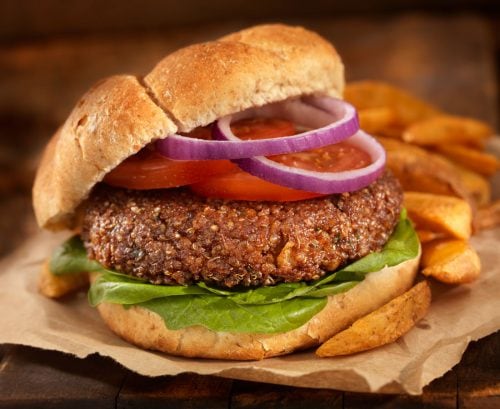
Vegans and vegetarians are thought to be more vulnerable to depression than the general population, but this may, in part, be down to the quality of the plant diet, rather than a lack of meat or animal products, new research suggests.
Australian researchers have found those who have a low-quality plant-based diet that includes a lot of processed foods may be at greater risk of developing depression than their vegan and vegetarian peers who eat plenty of fresh produce.
Lead author Megan Lee says, as vegetarianism and veganism has grown in popularity, a lot of ultra-processed plant-based products have come on to the market,
Many of the products are high in refined vegetable oils and refined grains, salt and sugar, Dr Lee says.
“People may inadvertently be consuming high levels of processed plant foods which is a known risk factor for increased depression.”
The study examined the diet quality and mental health of 219 vegans and vegetarians. The researchers found those who had diets high in fresh fruit, vegetables, nuts, seeds, legumes and whole grains were at lower risk of depression than participants with low-quality vegan and vegetarian diets.
The protective effect of a high-quality plant-based diet was likely due to the presence of quality carbohydrates, fibre, probiotics and antioxidants, Dr Lee says.
Other factors that may make vegans and vegetarians more susceptible to depression include their relatively young age and being more conscious about animal welfare and the environment, she suggests.
Overall dietary quality could be important for reducing risk. Vegans and vegetarians need to be mindful to avoid nutritional deficiencies common in these diets, such as lower intake of vitamins B2, B3, B5 and B12, zinc, iodine and long-chain fatty acids, that could negatively impact mental health and brain function.
5 ways to follow a high-quality plant-based diet
A well-balanced plant-based diet can be one of the healthiest eating patterns. To help make sure you’re getting everything you need, follow these five tips:
- Limit the amount of processed food you eat and focus on eating whole or minimally processed foods such as vegetables, fruit, nuts, seeds, legumes and whole grains.
- Make sure you get enough protein. Vegetarians and vegans have higher protein needs. Great sources of protein for plant-based diets include tofu, legumes, nuts, eggs, yoghurt and whole grain bread.
- Keep you iron up. Getting enough iron is especially important for women and children but is a bit harder on a plant-based diet because animal-sourced iron is easier to absorb. Make sure you include vitamin C-rich foods at meals to help you absorb iron from plant sources.
- If you are vegan, you need to consider taking a vitamin B12 supplement because this nutrient is only readily available in animal products. You can also include foods that are fortified with B12 such as some cereals and milk alternatives.
- Make sure your diet includes a wide variety of foods so you get the widest possible range of nutrients.
Article sources and references
- Lee MF, Eather R, Best TPlant-based dietary quality and depressive symptoms in Australian vegans and vegetarians: a cross-sectional studyBMJ Nutrition, Prevention & Health 2021;e000332. doi: 10.1136/bmjnph-2021-000332https://nutrition.bmj.com/content/early/2021/10/28/bmjnph-2021-000332
- Scimex, 16 November 2021. Not always greener: vegetarian diet quality influences mental health. Accessed Novemebr 2021https://www.scimex.org/newsfeed/not-always-greener-vegetarian-diet-quality-influences-mental-health
www.healthyfood.com










